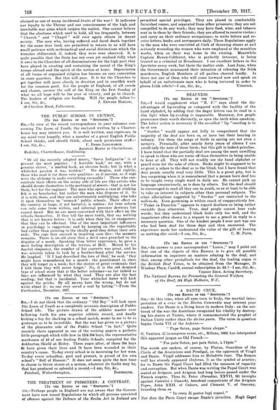THE PUBLIC SCHOOL IN FICTION,
Ito THZ EDITOR or THE &ROTATOR:1 gag,—In view of the recent correspondence in your columns con- terming The Loom of Youth, the enclosed written by a Charter- house boy may interest you. It is well written, and expresses, to my mind very happily, what a member of a great English Public School thinks, and should think, about such pernicious stuff.—
Assistant Master at Charterhouse. Bodcites, Charterhause, Godalming.
"Of all the recently adopted muses. 'Saera Indignatio ' is at present the most popular. 'A horrible book,' we say, with a genuine shiver, 'a morbid hook, an obscene book; but in what a white-hot passion it was written!' We despise, and rightly, those who read it for those very qualities: as if passion, as if rage were the alchemy to make everything excusable! Those who con- centrate their efforts on the seamy side of life are like artists who should devote themselves to the portrayal of sewers that is not for them, but for the engineer. The man who opens a ease of stinking Ash is no benefactor, but rather the man who disposes of it. So it is with those, and they are unfortunately multiplying, who take it upon themselves to 'unmask' public schools. Their effect on the country at large, if not harmful, is useless: for true reform con only come from within, and external pressure destroys hut cannot mend. But we are more concerned with their effect on the schools themselves. If they tell the mere truth, they say nothing that is not known before it is only when they lie, or exaggerate, that they can be effectual. One of the most important influenees in psychology is suggestion; and by harping on the regrettably bad rather than pointing to the ideally good they defeat their own ends. The rage they succeed in inspiring soon dies: the memory remains. There is an old story that a devil once preached in the disguise of a monk. Speaking from bitter experience, he gave a most feeling description of the terrors of Hell. Moved by his fearful eloquence, the number of his converts was great, and Ile was severely taken to task by a brother-fiend after the service. He laughed. 'If I had described the love of God,' lie said, 'they might have remembered for a month the punishment in store they will forget in a week; but the stories of great criminals that I told them they will never forget.' No, it is the old despised type of school story that is the better reformer—as far indeed as boys are influenced by what they read. They are also the hest reading; but that is incidental. Your white-hot hater will kick against the pricks. By all means hate the wrong, but do not write about it no one ever saved a soul by hating."—From the Carthusian, December, 1917.


























 Previous page
Previous page